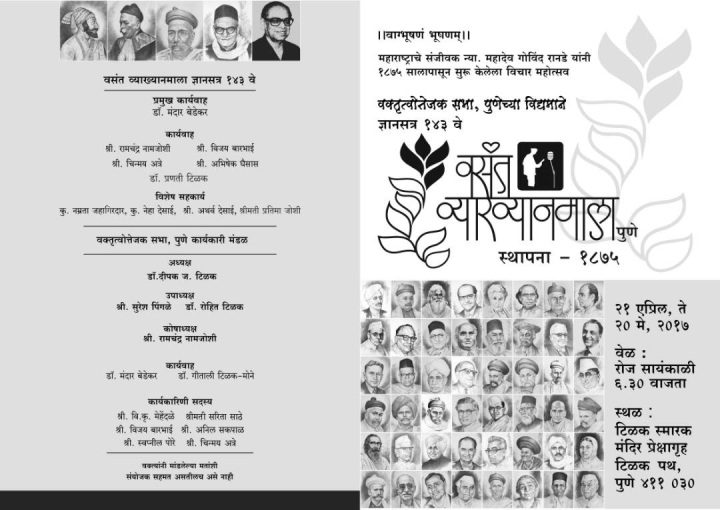‘वसंत व्याख्यानमाला’ (Vasant Vyakhyanmala- Spring Lecture Series) – A Great 143 Year Tradition
The 143rd edition of the month long ‘Vasant Vyakhyanmala’ (Spring Lecture Series),starts April 21 at Tilak Smarak Mandir. This lecture series was originally started by Justice Mahadev Govind Ranade in 1875.
I had written an article about this great 143 year tradition few years back, and I am reproducing a version of that below. I have also included the schedule for this year’s lecture series (click on the images at the end of this article). Do try to attend as many lectures as you can! Do note, many of the lectures are in Marathi (a few are in English). Please use the hash tag: #VasantVyakhyanmala or #वसंतव्याख्यानमाला when you tweet about these lectures.
This year’s schedule covers a series of topics including politics, governance, history, civic issues, music, literature, healthcare and many more. Good line up of speakers this year with a variety of different experience.
Some of the interesting speakers to look forward, over the month: Former Chief Minister of Maharashtra, Prithviraj Chavan, Mayor of Pune, Mukta Tilak, Dr. Madhavrao Gadgil, Pramod Choudhari and many more.
___________________
(blog-post from 2012 about Vasant Vyakhyanmala)
In recent years, TED and TEDx events are getting quite popular. They do a great job of presenting ideas from various experts and thought leaders. The first TED India event was very well received and many TEDx events have been held in various cities in India over the past year.
But did you know that an event similar in concept, but covering a broader range of topics, has been going on in Pune for 136 years! The great tradition of the ‘Vasant Vyakhyanmala’ (translation: ‘Spring Lecture Series’) was started by Justice M.G. Ranade in 1875. The idea was to present a variety of lectures, across various topics to the people. In those days, newspapers were in their infancy (Kesari had not yet started) and live lectures were the most effective medium for knowledge transfer.
Since the 18th century Peshwa era, Pune has always been a center of knowledge and education. Post the fall of the Maratha Empire in 1818, Pune city witnessed a tough period lasting for a few decades. The city’s economy was in shambles. Many scholars and learned experts left the city. Things started to improve towards the later half of the 19th century, under visionary leaders such as Justice Ranade (and later on Lokmanya Tilak).
Ranade, Tilak and other leaders of that period clearly saw the value of ‘Information’. The citizens had to be educated and informed. The Vasant Vyankhyanmala initiative was born out of the need to disseminate information and create awareness. Justice Ranade delivered the first lecture in 1875 in English. Over the years though, most lectures have been delivered in Marathi. Through its rich 137 year history, there have been very rare occasions, where the series had to be cancelled. For many years, the Vasant Vyankhyanmala was held at Hirabag and Belbag. It has been held at its present venue – Tilak Smarak Mandir, for many decades. Today, this series covers wide ranging topics such as Culture, Arts, Economics, Science, Health, Governance, History, etc.
While I have followed this lecture series over the years through media coverage, this was my first year attending it. The event format and the organization was very good. The only negative in my view was the number of attendees (probably less than 500). In the pre-independence era, 1000s attended these lectures. Today, there are many other media sources for getting information, but an informative and thought-provoking live lecture is still a very powerful source. If you are in Pune, you should definitely try and attend at least some of these lectures, over the next 3 weeks. The lectures are virtually free to attend (Single lecture ticket costs Rs 5 and the season ticket is Rs 100).
There is a need to get the word out regarding Vasant Vyakhyanmala. More media publicity and social media presence will definitely help. I do hope that in the next few years, this great tradition that started in 1875 will continue to thrive, and reach much bigger audience.
______________________________

Vasant Vyakhyanmala 2017 – Schedule

____
leave a comment